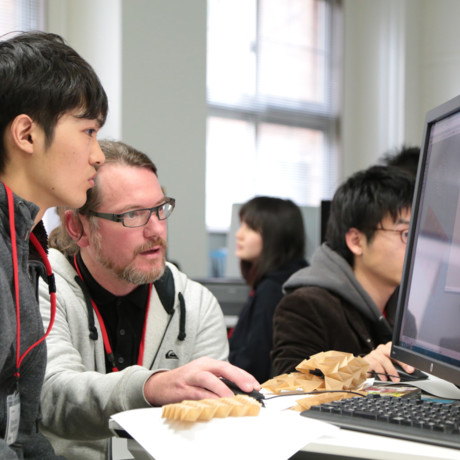




Kyoto 2016 Workshop
Research Through TeachingFold Printing
Fold Mapping
WORKSHOP AT KYOTO D-LAB March 2015
FOLDING = CODE FOR MATTER
By way of introduction to our research, we find it most fortunate to present our preliminary research findings in Kyoto, Japan, close to the heart of origami. Though it is not the origins of origami we seek, though paper as a medium lends itself most pliantly to the act of folding, instead we seek to understand folding in a more general, functional and aesthetic way; to study folding as a structural language. We begin with the premise that folding is coding for matter, an idea that seems to emerge from computer science, but points to the notion that materials themselves do computation, and folding, or ORI*, is a functional way to sense, program and transform the code of matter.In this exhibition, we present a cross-section through time, tradition and technology. We present the tradition of folding as beauty and function perfected in daily life objects from the KIT archive collection, alongside KIT D-LAB students present findings practices of folding in present day in Kyoto. Our folding and technology research reveals new ways to code matter with folds: as outcomes of a workshop with Ars Electronica Futurelab researchers Gardiner and Ogawa that explores the ideas of ORI* as ‘programable’, ‘sense-able’, and ‘transformable’.
A set of tactile 3D printed fabric and elastomer composites allow us to explore a collection of natural ORI* patterns, along with prototypes of novel soft oribots. The combination of origami and robotics in Matthew Gardiner’s Oribotic blossoms gently breath in and out to the movements of visitors.
This exhibition is presented as ‘collaboration in the making’ focused on deepening our mutual understanding of the language of folding. Our outcomes are research-based, we employ various methodologies from design, artistic research, and technological research.
Catalogue Essay by Matthew Gardiner, Hideaki Ogawa & Prof. Takayuki Ikegawa
Presented by: KYOTO Design Lab
Kyoto Institute of Technology.
Materials
Workshop Soft Materials
ORI* research extends in many directions and fields of research, humans have studied nature and discovered folds at all scales of life. We examine those folds, with a view to understand how they might help us code matter to develop new ORI* concepts that are programmable, transformable, and sense-able.

